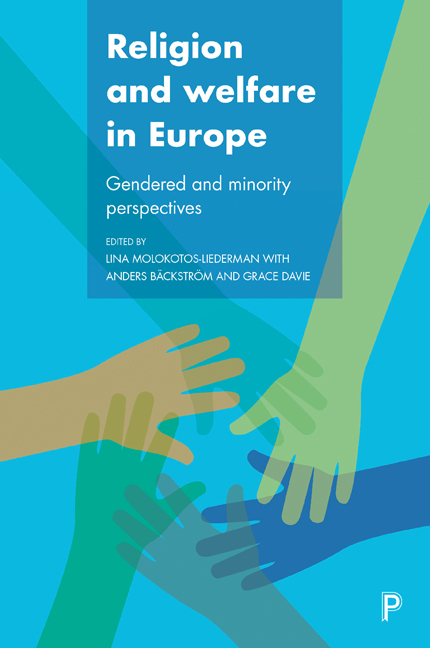Book contents
- Frontmatter
- Contents
- List of tables, figures and maps
- Acknowledgements
- Notes on contributors
- one Introduction
- Part One Thinking methodologically: approaches to research and practice
- Part Two Thinking regionally: key case studies in welfare and religion in Europe
- Part Three Gendered and minority perspectives
- Part Four Drawing the threads together
- Appendix: the WaVE team
- Index
Twelve - Welfare and values in Europe: insights drawn from a comparative cross-country analysis
Published online by Cambridge University Press: 05 April 2022
- Frontmatter
- Contents
- List of tables, figures and maps
- Acknowledgements
- Notes on contributors
- one Introduction
- Part One Thinking methodologically: approaches to research and practice
- Part Two Thinking regionally: key case studies in welfare and religion in Europe
- Part Three Gendered and minority perspectives
- Part Four Drawing the threads together
- Appendix: the WaVE team
- Index
Summary
Introduction
This chapter works on two levels. On one level, it is a summation of the comparative dimensions of the Welfare and Values in Europe: Transitions Related to Religion, Minorities and Gender (WaVE) project, and applies a comparative lens to the material emanating from the 13 case studies that formed its core. On the second level, the chapter provides a framework though which the threads in the preceding chapters can be brought together. Clearly, the two overlap in so far as the chapters gathered here build on the original project very directly, developing its themes in light of the social changes that have taken place since 2009 and of the growing literature in the field. The exemplification, however, will be wide-ranging in order to display the impressive scope of WaVE and the questions provoked by its findings.
As suggested by the project's subtitle, three major and interconnected dimensions of social change in Europe are identified and examined through the prism of welfare – that is, changes related to religion, minorities and gender. It is no exaggeration to say that these dimensions of social change have seen rapid transformation in the past few years and months, transformations so momentous as to threaten core conceptions of social solidarity in Europe. As one might expect, this questioning of the theory of a ‘social Europe’ has been accompanied by an even more alarming unravelling of a ‘social Europe’ in practice, particularly as the severe financial crisis that has affected Europe for the past decade or so has been exacerbated by the added layer of the refugee crisis of recent years (sparked especially by the war in Syria but not limited to it). Across Europe we have seen welfare systems build thick and exclusionary walls and value systems implode. With regard to the latter, for example, Danish, Swiss and Swedish conceptions of national identity linked to the values of tolerance, opportunity, and welcome, respectively, have been severely challenged by the refugee crisis.
There is a special need for comparative study of these developments, particularly as they comprise a religious dimension. As noted elsewhere in this volume (see especially Chapters Two and Five), religion is undergoing a process of globalisation, provoking, simultaneously, a series of reactions or counter-movements: both tendencies increase the need for comparative and transnational studies.
- Type
- Chapter
- Information
- Religion and Welfare in EuropeGendered and Minority Perspectives, pp. 261 - 290Publisher: Bristol University PressPrint publication year: 2017



